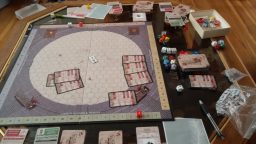WARGAME WEDNESDAY: Pursuit of Perfection: Gladiator: Quest for the Rudis
Wednesday , 7, June 2017 Wargames Leave a comment In my previous article I discussed how Euro games can have much of the feel of Wargames while looking at Chaos in the Old World. This week we are looking at a Wargame set on a board instead of a traditional tabletop called Gladiator: Quest for the Rudis. It’s a kickstarted game, and while it suffers from certain predictable faults such as lower polish and mediocre art than many games you might be used to I have found it a fascinating study for Wargame design and the translation of a gladiator into a turn-based-yet-fluid unit with distinct flavor and flair based on equipage.
In my previous article I discussed how Euro games can have much of the feel of Wargames while looking at Chaos in the Old World. This week we are looking at a Wargame set on a board instead of a traditional tabletop called Gladiator: Quest for the Rudis. It’s a kickstarted game, and while it suffers from certain predictable faults such as lower polish and mediocre art than many games you might be used to I have found it a fascinating study for Wargame design and the translation of a gladiator into a turn-based-yet-fluid unit with distinct flavor and flair based on equipage.
All you hipsters out there can push your glasses up and tell your friends how you prefer the originality of indie games to mainstream industry ones now. Just get it out of the way and go get another microbrew.
Gladiator puts players in the position of a stable owner, theoretically training and tracking the performance and growth of individual gladiators between successive matches. The meat of the game of course comes from the back and forth dance of gladiator, animal, and weapon tokens on a hex-grid arena as battle commences. Players use attack and defense cards that relate to their gladiator’s style, from murmillo to thorax to secutor to more exotic specialties, and the success is based on a die roll; randomization cards are included for those not used to a d20 system. Wounds and injuries are varied and realistic: leg injuries cripple, head injuries can stun or knock unconscious, and armor all feels very right in its application when mitigating damage. Players go back and forth with a seize/hold-the-initiative match which will occasionally allow a nimbler gladiator two turns in a row.
One of the best things this game can show a budding designer or appreciator of Wargaming the excitement that ought to carry with each roll of the dice, with each exchange of the simultaneous offense and defense effects. So often I remember throwing a fistful of dice as a group of soldiers volleyed, and rolling through the to-hit, to-damage, and then watching my opponent roll his mitigation rolls and when considering the actual effects playing out from a soldier’s perspective I realize that traditional RNG system feels very lackluster. With a simultaneous effect, every exchange became exciting as these gladiators ducked and the swing went high, or lashed out at an exposed leg only to glance off the armor of their opponent. Each roll, each reference to RNG or dice was equally breath-catching and the decision-making downtime was elegantly simple, building tension with excellent, natural pacing in a way I have never seen before. As my roommate moves his gladiator on the attack and begins shuffling through his offensive cards, I grimace at my gladiator’s low stamina and decide if I gamble on one of my minimal-investment defenses or if I defend my health with a costly burst of effort. Additionally, the whole game is seeded through with Latin terminology which lends an exotic but reasonable lingo and feel to the gameplay.
The game suffers from a certain amount of arcane rules text and a graphically displeasing vibe, the flow of the game clips along well. I feel there are ways the game could be simplified further, and the cards re-designed to make them more friendly to new players–after all, one of the hallmark metrics for a game is how easy it is to get a new player to approach a new game with its unique ruleset and terminology and play patterns. It is a mammoth front-end investment, and it needs to be remembered that cutting this down is a priority.
Gladiator: Quest for the Rudis sells itself as a reasonable dueling game for two players, but supports more as well as tournament, league, and stable play. While lacking some of the extra goodies and influential monetary spending in a game like Blood Bowl where you can hire magicians to lightning-bolt your opponents, there’s a strangely intimate attachment that you develop for your very-human pawns. Wargames which feel this good are rare to my experience, and the hours I have spent playing it surprised me. With very little dead time and a springy pace of play which accelerates so nicely, I am pleased to have the game around to study…for the best games are yet to be made.
-Paul A.
Please give us your valuable comment